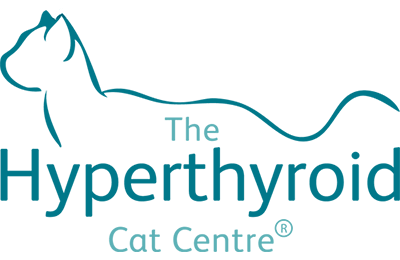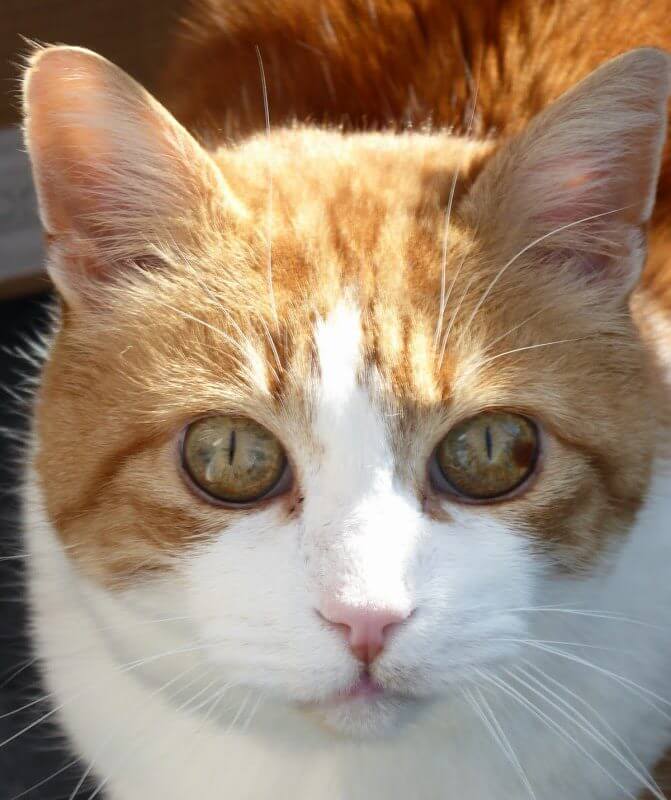During a routine check-up, which our ginger cat Percy has every six months, our vet suggested he needed a blood test. While I don’t like unnecessarily carrying out invasive procedures on our cats, I sensed that the vet suspected that there was a problem with Percy, even though she hadn’t said anything at that time.
The vet’s phone call with the blood test results confirmed something was wrong. She told us that Percy had hyperthyroidism. We went back to have a further consultation. It was then that she suggested that it was possible, as an alternative treatment to a lifetime of tablets, to send Percy to hospital for a short time, to the Hyperthyroid Cat Centre in Yorkshire. Another choice of treatment, dosing Percy with tablets twice a day for the rest of his life, was a procedure which we dreaded, since it is almost impossible to get tablets down him. The only way we could get him to take the tablets that he was initially on was to disguise them in salmon paste – and the only paste he liked was Aldi’s. We tried cheese, cat food, butter and several other disguises, to no avail. We decided that treatment at the Hyperthyroid Cat Centre must be the best solution for him.
Percy had to have several further tests before going to the Centre, including a thorough check of his heart, as it was suspected he might have had a blood clot in the past – a suspicion that mercifully proved to be unfounded. He also had to have a urine test and another blood test. He passed all those with flying colours, showing that despite his 14 years he was in good health except for his hyperthyroidism.
The journey to Wetherby was not a good one. 100 miles in a cat carrier did not please Percy, who, up to then, had never been more than about half a mile in the car to the vets. However, he made it with loud complaints and some loss of dignity. On arrival he soon calmed down. Apart from the atmosphere there being a calming influence on him, he saw the staff as obviously non-threatening. He soon began to wash himself, showing that he was calm and becoming settled in his new environment, even though he was still in his cat carrier.
Meanwhile we were well looked after at the Centre. Some tea, and lovely homemade cakes, made by one of the staff, were very welcome after a stressful journey. We were fully briefed on his treatment, and what we needed to do during his convalescence, and when and how he needed to be handled. After a thorough examination to make sure he was OK for treatment, we left Percy, confident that he was in good hands.
During his stay we were updated each day on his progress. His iodine treatment was carried out under sedation, on his first day, and was successful. On each subsequent day he responded well to the staff, enjoying the attention he received.
The day came when we were to collect him. We were given charts of his test results during his treatment, and detailed information on the next few weeks monitoring. After ensuring that we knew how to treat him, we took possession of him and drove him home.
The homeward journey was surprisingly less stressful for Percy than the outward one, despite the fact that he was housed in the boot of the car, away from us in the front seat, and any danger from the radioactivity he still possessed. Andrew kindly gave us a large sack of cat litter suitable for flushing down the loo rather than normal disposal in the dustbin, preferred when radioactivity is present.
At home he was housed in the spare bedroom, which at first he didn’t like. However, an effective solution was to buy a Feliway diffuser pack which you plug into the mains, recommended by the Centre. This is designed to have a calming influence on cats. We ordered it from Amazon for urgent delivery, and soon had it installed. As a result Percy quietened down somewhat, and willingly accepted his situation.
We made sure that the routine we adopted was as close to his normal routine at home as it could be. We fed him with his normal food, at the times he would normally be fed. We changed his cat litter frequently, flushing the soiled stuff down the loo. We made sure that he got as much attention as his situation would allow, which meant as well as taking his food to him, we visited him in his room at least a couple of times a day, and made a fuss of him. Once a day, while the room was being cleaned, we let him out, making sure that all doors in the house were closed so that he could venture no further than the stairs. We also ensured that our other cat, Charlie, was safely shut away to avoid extra paws sharing Percy’s litter tray. Once his room was cleaned and tidied, we would get him to come back to his confinement with cat treats, which he did readily. If we want him to do something, we provide him with food or cat treats. He is easily persuaded with either.
The day came when it was time to let him out of his confinement, and let him have selective access to the rest of the house. He was not allowed in the kitchen, because there was a cat door leading to the outside, which we felt at this stage he shouldn’t have access to. Going outside would have to wait a bit. Also access to the hall was restricted in case of callers. Otherwise he was allowed anywhere other than the main bedroom (for obvious reasons). If somebody called and we needed to answer the front door, Percy could be got out of the hall with a suitable bribe – Felix cat treats were his favourite.
We were running low on cat litter at this stage. The best web site for purchasing items like this, we have found, is in Germany. Their web site is in English, and they do not charge for postage if the total price of your order is over £29. They use DPD to deliver, which is another plus point. The web site is zooplus.co.uk. We purchased 40kg of flushable cat litter from them, and got some free cat food thrown in, which both of our cats loved.
The biggest problem we encountered when Percy was released from confinement was his demanding to be let out of the house, something which we had to refuse at first, and later on, control strictly. The second biggest problem was his trying to sit on one of our laps, which we had to restrict to a few minutes a day. He did not take kindly to his restrictions, since he had been used to plenty of time on his owners’ laps, and unlimited freedom to roam outside, before his treatment. His reaction was to protest loudly, and to sulk.
The day came when Percy was no longer radioactive and we were able to let him out freely. We first let him out about ten minutes before he was due to be fed, because we knew that when we called him he would come running. Food is a very effective bribe or inducement for Percy. It always works. We wanted to see whether he was capable of coping with being outside. We needn’t have worried.
Percy has now completely recovered, and is renewing acquaintances with his friends in the neighbourhood, and also encountering his sworn enemies. He has regular contretemps with his other half, Charlie, who is a female long-haired tortoiseshell former stray who adopted us and lives with us, whom he tolerates rather than makes friends with. In fact, Percy is now leading a normal life once again.
His treatment cost included a deposit of £160, and the total was £1,800. However, because he was fully insured, the procedure was very simple. We paid the initial deposit, and the Centre saw to all the dealings with our insurance company, Direct Line. The deposit was promptly refunded to us, and the Centre was paid the balance. Direct Line was very good, paying without any argument.
If your cat is in good health, with the exception of his or her hyperthyroidism, this treatment is definitely the best alternative. It means you don’t have to give your cat tablets again, provided the treatment is a success and the illness doesn’t recur. The saving in effort after treatment is completed is incalculable. We felt this was by far the best choice when we went ahead. It’s well worth the hassle, which lasts about six weeks, to have your cat free of all medications, and only needing occasional monitoring for his or her health in the future.
If your cat is in good health, with the exception of his or her hyperthyroidism, this treatment is definitely the best alternative.
Percy and his family



